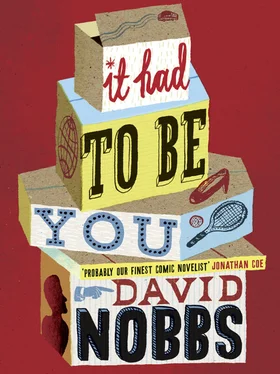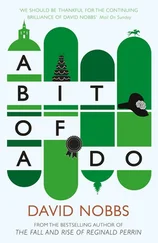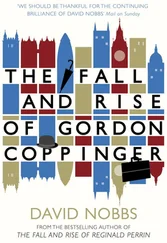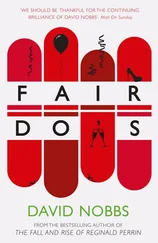David Nobbs
It Had to be You
For the Goddard and Stubbs families, who have brought
so much pleasure into my life
Wednesday
Thursday
Friday
Saturday
Sunday
Monday
Tuesday
Wednesday
Thursday
Acknowledgements
About the Author
Other Books by David Nobbs
Copyright
About the Publisher
Wednesday
A husband and wife were driving, in separate cars, towards two very different luncheon appointments. It was a glorious June morning, quite unsuitable for sudden death, yet only one of them would arrive.
Deborah Hollinghurst was driving along a quiet country road. She was in danger of being early, and she really didn’t think it would be stylish to be early, not today, not yet. So she was driving sedately, at a steady forty-five miles an hour along the winding road, to the irritation of the drivers of a couple of vans that had once been white. Her car was a convertible, but the roof was not down. She didn’t want the wind in her hair, not today. Next month she would be forty-seven. She was still lovely, but she was beginning to feel that her loveliness needed all the help it could get. Especially today. She felt excited, but also a little fearful. The fear was only faint, but it was getting stronger with every mile that she drove. She felt as if she was about to step off the edge of the world. Her world, anyway. She told herself that she didn’t have to step off. Nothing had been decided. She didn’t believe herself. She knew that everything had been decided.
A rabbit with myxomatosis stood at the side of the road, blind, impervious, a stone statue, like a ghastly garden sculpture of a rabbit. Deborah swerved to put it out of its misery, shuddered at the squelch of the tiny impact, on that glorious June morning, so unsuitable for sudden death.
A heron flapped slowly, contentedly across a field beside the road. Soon, if it had its way, a fish would meet its sudden death. The calm of the morning was illusory, its beauty marred by a thousand little tragedies.
To James Hollinghurst the morning had no beauty. The windows of the totally unnecessary 4 x 4 were closed, the air conditioning was on, his world was a mobile fridge, summer had no place in it, summer had been banished as a frivolous nuisance. He was on the M1, in the middle lane. He was in danger of being late, and he didn’t think it would be wise to be late, not today.
He was anxious. It was not going to be an easy meeting. He put his foot down. Eighty-five. Ninety. Ninety-five. He didn’t want to be caught on a speed camera, but anything was better than being late today.
He was listening to Classic FM. The adverts began, and he leant forward and pressed a button, which switched the radio over to another channel. He didn’t like the adverts. Their repetition irritated him. He had dark, unruly hair, thick untamed eyebrows, a high forehead and a low boredom threshold.
The next station that he found had music on it, or what passed for music. ‘Call that music,’ he shouted. He shouted at the radio a lot. It was what he had it on for. He was forty-eight. He was on quinapril, amlodipine and bisoprolol hemifumerate for his blood pressure, and simvastatins for his cholesterol.
Unfortunately the music stopped, and the DJ announced that he was going to speak to Tracey from Doncaster. James groaned. It was very possible that Tracey from Doncaster was a lovely girl. He often met people who were much nicer than the towns they lived in. But he didn’t think Tracey could tell him anything that he really needed to know at this moment. He switched back to Classic FM. The adverts were almost over.
‘We’ve more relaxing music for you in the next hour,’ purred the presenter in the honeyed, reassuring, faintly patronising tone adopted by almost all the announcers on Classic FM.
‘Relaxing?’ groaned James. He desperately needed to relax. Packaging was the first thing to suffer in a recession. If people had bought less, they had fewer things to pack. But he didn’t want to listen to relaxing music. He wanted to be transported into another world by great music. ‘I know you’ve done a lot for classical music,’ he told the presenter sorrowfully. After all, the man sounded nice and was probably kind to his wife. ‘But really, is that what you think great music is about? Did Beethoven say, “Darling, I think I created something memorably relaxing this morning”? Did Mrs Mahler find Mahler spark out as she brought him his morning coffee? “Sorry, Ingeborg, this symphony I’m writing is so relaxing I must have nodded off.” Give me great music. Stirring music. Please.’
He reached forward to press the button again, feeling a stab of pleasure at reducing the announcer to impotence. How he wished people could feel it when he switched them off. ‘Bad news, Monty. We’ve lost James Hollinghurst. The bastard was distinctly unimpressed. He’s switched over to BBC Radio 3.’
He accelerated with a sudden surge of impotent anger, and swung out into the fast lane. Surely, the way James was driving, if one of the Hollinghursts was to have a fatal accident that day, it would be him?
Not so.
Deborah came to a rare straight stretch of road. Four cars were proceeding smoothly in the opposite direction. A fifth, a Porsche, was overtaking them at speed. Suddenly she realised that it was going to be a close-run thing, if she didn’t slow down to let the driver through. Why should she, though? He was the one at fault, arrogant, rich, spoilt, in his expensive car. He deserved to have a moment of shock, of doubt, of fear. She’d brake, of course she would, she’d have to, but not for a couple of seconds.
It was the worst decision she ever made in her life.
It was also the last decision she ever made in her life.
A tall man, elegant in white linen, sat at a window table in the pink and cream restaurant, toyed with a glass of rather average house white and looked out over the gardens, which sloped down towards the gently flowing water. He wouldn’t like his name to be revealed. He shouldn’t be there. He’d chosen the place because he wasn’t known there. He’d kept his wits about him, and he was certain that nobody had followed him. The only private dick he needed to be concerned with was the one in his sharply creased trousers, which was so stimulated that he was finding it hard to keep it private. Let us allow him his precious anonymity – for the moment, at least.
There’s no need to name the hotel either. One of the things that had most attracted him to it was its obscurity. It was a long way from anybody he knew, and a long way from anybody whom the woman he was expecting knew. Let’s just say it was the Whatsit Arms, prettily situated on the banks of the River Thingamayjig, just outside the pleasant but not distinguished little village of Somewhere-juxta-Nowhere. It was mentioned in no guidebooks. It had no Michelin stars. It was perfect.
He had the table furthest from the door. He sat facing the door. Every time anybody entered he felt a frisson of excitement, soon dashed. My God, he said to himself with a wry internal smile, as he watched the lunchers enter, we’re an ugly race.
He wasn’t surprised that she was late. He’d expected her to be late. It was stylish for a woman to arrive late, and she was very stylish. He’d guessed that she would be eight, nine, perhaps ten minutes late. It was correct, and he always liked to be correct, which was why he’d had to be so secretive. There was no way what he was doing today was correct. A clandestine lunch with a married woman. Not his style at all. And, of all married women, this one.
Not just lunch, either. Or so he hoped. Not half an hour ago he had booked a double room for the night, just in case. He could hardly believe that he had been so bold. But if things went well, and if the mood was right, and if he did manage to persuade her, it might be disastrous to have to go through all the business of booking, of pretending to be a married couple, of giving false names. Do you need any help with your luggage? We have no luggage. Only baggage.
Читать дальше












